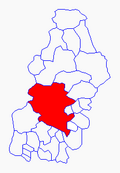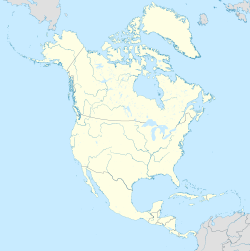
Back Tègucigalpa ACE Tegucigalpa Afrikaans Tegucigalpa ALS ቴጉሲጋልፓ Amharic Tegucigalpa AN Tēhugigalpa ANG تيغوسيغالبا Arabic تيجوسيجالبا ARZ Tegucigalpa AST Tegucigalpa AVK
Tegucigalpa | |
|---|---|
| Tegucigalpa, Municipio del Distrito Central | |
Tegucigalpa at night View of the city from the mountains | |
| Nickname(s): | |
 Location of the Central District within the Department of Francisco Morazán | |
| Coordinates: 14°06′21″N 87°12′17″W / 14.10583°N 87.20472°W | |
| Country | Honduras |
| Department | Francisco Morazán |
| Municipality | Central District |
| Founded | 29 September 1578 |
| Capital | 30 October 1880 |
| Merged as Central District | 30 January 1937 |
| Government | |
| • Type | Mayor-Council |
| • Body | Municipal Corporation |
| • Mayor | Jorge Aldana (LIBRE) |
| • Vice Mayor | Cárlenton Dávila (PSH) |
| • Aldermen | |
| • Municipal Secretary | Cosette Lopez Osorio |
| Area | |
| 1,502 km2 (580 sq mi) | |
| • Urban | 201.5 km2 (77.8 sq mi) |
| Elevation | 990 m (3,250 ft) |
| Population (2023 projection)[5] | |
| 1,326,460 | |
| • Density | 880/km2 (2,300/sq mi) |
| • Urban | 1,199,136 |
| • Urban density | 5,900/km2 (15,400/sq mi) |
| Demonym(s) | Spanish: tegucigalpense, comayagüelense, capitalino(a) |
| GDP (PPP, constant 2015 values) | |
| • Year | 2023 |
| • Total | $10.5 billion[6] |
| • Per capita | $6,700 |
| Time zone | UTC−6 (Central America) |
| Postal code | |
| Area code | (country) +504 (city) 2[8] |
| Annual budget (2008) | 1.555 billion lempiras (US$82,190,000) |
| Website | Government of Tegucigalpa |
Tegucigalpa (UK: /tɛˌɡuːsɪˈɡælpə/[9] US: /təˌ-/[10][11] Spanish: [teɣusiˈɣalpa])—formally Tegucigalpa, Municipality of the Central District (Spanish: Tegucigalpa, Municipio del Distrito Central or Tegucigalpa, M.D.C.[12]), and colloquially referred to as Tegus or Teguz[13]—is the capital and largest city of Honduras along with its sister city, Comayagüela.[14]
Claimed on 29 September 1578 by the Spaniards,[15] Tegucigalpa became the Honduran capital on 30 October 1880, under President Marco Aurelio Soto, when he moved the seat of government from Comayagua,[16] which had been the Honduran capital since its independence in 1841. The 1936 constitution established Tegucigalpa and Comayagua as a Central District,[17] and the current 1982 Honduran Constitution continues to define the sister cities as a Central District[c] that serves as the permanent national capital.[18][19]
Tegucigalpa is located in the southern-central highland region known as the department of Francisco Morazán of which it is also the departmental capital.[20] It is situated in a valley, surrounded by mountains. Tegucigalpa and Comayagua, being sister cities, are physically separated by the Choluteca River.[21] The Central District is the largest of the 28 municipalities in the Francisco Morazán department.[22]
Tegucigalpa is Honduras' largest and most populous city as well as the nation's political and administrative center. Tegucigalpa is host to 25 foreign embassies and 16 consulates.[23][24] It is the home base of several state-owned entities such as ENEE and Hondutel, the national energy and telecommunications companies, respectively.[25] The city is also home to the country's most important public university, the National Autonomous University of Honduras,[26] as well as the national soccer team.[27] The city is served by two international airports, Comayagua and Toncontín.[28][29][30]
The Central District Mayor's Office (Alcaldia Municipal del Distrito Central) is the city's governing body,[31] headed by a mayor[32] and 10 aldermen forming the Municipal Corporation (Corporación Municipal).[33] Being the department's seat as well, the governor's office of Francisco Morazán is also located in the capital. In 2008, the city operated on an approved budget of 1.555 billion lempiras (US$82,189,029).[34] In 2009, the city government reported a revenue of 1.955 billion lempiras (US$103,512,220), more than any other capital city in Central America except Panama City.[citation needed]
Tegucigalpa's infrastructure has not kept up with its population growth.[35] Deficient urban planning,[36] densely condensed urbanization, and poverty[37] are ongoing problems.[38] Road infrastructure is unable to efficiently handle over 400,000 vehicles, resulting in heavy congestions.[39] Both national and local governments have taken steps to improve and expand infrastructure as well as to reduce poverty in the city.[40][41]
- ^ Tiroren (2008). "Meaning of word "Tegus"". tuBabel.com. Archived from the original on 24 March 2016. Retrieved 29 June 2011.
- ^ "Enjoy your Tegucigalpa Expat Experience". InterNations.org. 22 May 2011. Archived from the original on 26 December 2018. Retrieved 29 June 2011.
- ^ "Distrito central: Informacion del municipio". XVII Censo de Población y VI de Vivienda 2013. Archived from the original on 19 August 2016. Retrieved 30 July 2016.
- ^ Cite error: The named reference
Political Divisionwas invoked but never defined (see the help page). - ^ a b Citypopulation.de Archived 7 January 2021 at the Wayback Machine Population of departments and municipalities in Honduras
- ^ "TelluBase—Honduras Fact Sheet (Tellusant Public Service Series)" (PDF). Tellusant. Archived (PDF) from the original on 1 February 2024. Retrieved 11 January 2024.
- ^ a b Honducor (10 May 2008). "ZIP Codes for Honduras". Honduras.com. Archived from the original on 26 December 2018. Retrieved 29 June 2011.
- ^ Hondutel (14 October 2009). "Honduras Country Codes". CallingCodes.org. Archived from the original on 26 December 2018. Retrieved 29 June 2010.
- ^ "Tegucigalpa". Lexico UK English Dictionary. Oxford University Press. Archived from the original on 26 November 2020.
- ^ "Tegucigalpa". The American Heritage Dictionary of the English Language (5th ed.). HarperCollins. Retrieved 3 August 2019.
- ^ "Tegucigalpa". Merriam-Webster.com Dictionary. Merriam-Webster. Retrieved 3 August 2019.
- ^ Mario Secoff (13 March 2005). "Municipality of Tegucigalpa-Distrito Central section". Angelfire. Archived from the original on 28 September 2011. Retrieved 29 June 2011.
- ^ "Téguz y no Tegus, algo que todos debemos saber…". vuelvealcentro.com. 10 October 2016. Archived from the original on 18 October 2016. Retrieved 30 January 2017.
- ^ Kiara Pacheco (15 October 2010). "Spanish:What is the capital of Honduras?". saberia.com. Archived from the original on 1 April 2017. Retrieved 29 June 2011.
- ^ Oscar Acosta (original) (13 February 2011). "About Tegucigalpa". Emporis Corporation. Archived from the original on 2 November 2012. Retrieved 29 June 2011.
- ^ Anonymous at the Honduras National Library (19 May 2008). "Spanish:Tegucigalpa, a particular story-pg. 3" (PDF). Francisco Morazán National Pedagogic University. Archived from the original (PDF) on 4 November 2011. Retrieved 29 June 2011.
- ^ Government of Honduras (1 February 2001). "1936 Constitution of Honduras-Decree No. 53, reformed Article 179". HistoriadeHondura.hn. Archived from the original on 24 March 2014. Retrieved 29 June 2011.
- ^ Government of Honduras (31 January 2001). "1982 Constitution of Honduras-Title I, Chapter I, Article 8". Honduras.net. Archived from the original on 1 November 2017. Retrieved 29 June 2011.
- ^ Government of Honduras (31 January 2001). "1982 Constitution of Honduras-Title V, Chapter XI, Article 295". Honduras.net. Archived from the original on 14 June 2011. Retrieved 29 June 2011.
- ^ BATMAN (30 June 2008). "Spanish: Department of Francisco Morazán". ecohonduras.net. Archived from the original on 6 September 2011. Retrieved 29 June 2011.
- ^ OPTURH writer (15 March 2010). "Spanish: Tegucigalpa, a city with much history". Operadores de Turismo Receptivo de Honduras. Archived from the original on 26 October 2011. Retrieved 29 June 2011.
- ^ "Spanish: Map of Francisco Morazán Department". zonu.com. 13 May 2009. Archived from the original on 3 March 2016. Retrieved 29 June 2011.
- ^ Foundation for the Investment and Development of Exportations (FIDE) (4 August 2009). "Embassies and Consulates in Honduras". hondurasinfo.hn. Archived from the original on 16 June 2013. Retrieved 29 June 2011.
- ^ GoAbroad.com writer (28 February 2011). "Embassies in Honduras". GoAbroad.com. Archived from the original on 3 March 2016. Retrieved 29 June 2011.
- ^ hondurasinfo.hn writer (12 June 2006). "Government Offices in Tegucigalpa". .hondurasinfo.hn. Archived from the original on 16 June 2013. Retrieved 29 June 2011.
- ^ Junta de Dirección Universitaria (29 March 2010). "National Autonomous University of Honduras". UNAH. Archived from the original on 27 May 2013. Retrieved 29 June 2011.
- ^ FENAFUTH (8 January 2010). "Honduras National Autonomous Football Federation (FENAFUTH)". fenafuth.org. Archived from the original on 2 July 2018. Retrieved 29 June 2011.
- ^ Ryan Bert (29 April 2001). "Difficult Approach + Short Runway = Challenge". Airliners.net. Archived from the original on 26 May 2016. Retrieved 29 June 2011.
- ^ Jaclyn Liechti & Kate Sitarz (31 July 2010). "World's Scariest Airports". SmarterTravel.com. Archived from the original on 3 March 2016. Retrieved 29 June 2010.
- ^ Microsoft Flight Simulator X (4 June 2007). "Tegucigalpa's Toncontín". SimTours.net. Archived from the original on 27 July 2018. Retrieved 29 June 2010.
- ^ Juan Diego Zelaya; Vice Mayor (June 2010). "AMDC Organization Chart" (PDF). AMDC. Archived from the original (PDF) on 27 March 2012. Retrieved 28 September 2011.
- ^ AMDC (24 October 2008). "Central District Mayor". AMDC Transparencia. Archived from the original on 28 October 2011. Retrieved 29 June 2011.
- ^ AMDC (24 October 2008). "Central District Municipal Corporation". AMDC Transparencia. Archived from the original on 28 October 2011. Retrieved 29 June 2011.
- ^ Alcaldia Municipal del Distrito Central (12 February 2008). "Spanish:Tegucigalpa City Hall approves budget of 1.555 billion lempiras for 2008". Hondudiario.com. Archived from the original on 29 January 2012. Retrieved 29 June 2011.
- ^ El Nuevo Herald (30 September 2009). "Spanish:Tegucigalpa reaches 431st birthday in tension". zonadenoticias.com. Archived from the original on 26 March 2012. Retrieved 29 June 2011.
- ^ Karla Gomez (9 May 2011). "Spanish: Zoning laws do not impede businesses invading residential zones". El Heraldo de Honduras. Archived from the original on 20 September 2014. Retrieved 29 June 2011.
- ^ El Nuevo Herald (30 September 2009). "Spanish:Tegucigalpa with high-risk zones for construction". zonadenoticias.com. Archived from the original on 4 June 2013. Retrieved 29 June 2011.
- ^ Reducing Risks of Landslides and Earthquakes-PNUD (19 November 2010). "Spanish: Unorganized growth of the city requires a 'stop'". Revista Construir. Archived from the original on 4 February 2015. Retrieved 29 June 2011.
- ^ "Spanish: Government of Honduras seeks reducing traffic". El Heraldo de Honduras. 24 February 2011. Archived from the original on 27 February 2011. Retrieved 29 June 2011.
- ^ Sheila Salgado (27 April 2011). "Spanish: BCIE grants US$46.1 million for infrastructure in Tegucigalpa". hondudiario.com. Archived from the original on 25 January 2013. Retrieved 28 September 2011.
- ^ Central District Municipal Office (AMCD) (25 September 2008). "Spanish: Capital450-the city we want!". AMCD. Archived from the original on 15 January 2019. Retrieved 28 September 2011.






